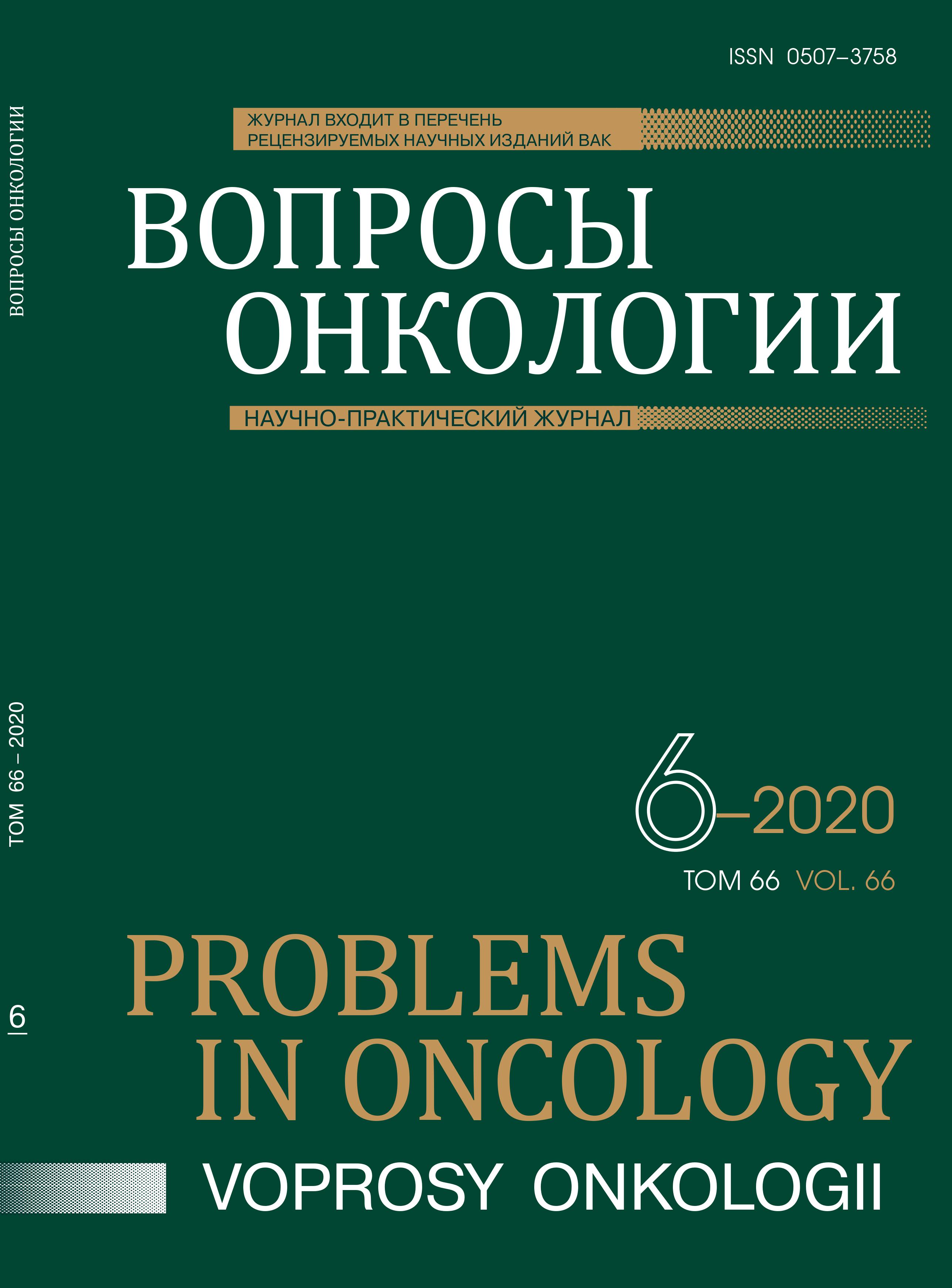Abstract
Purpose. The heterogeneity of target receptors expression may cause different responses of the primary tumor and metastases of renal cell carcinoma (RCC) on tyrosine kinase inhibitors therapy. The aim of the study was to investigate expression and prognostic value of vascular endothelial growth factor (VEGFA) and fibroblast growth factor (FGF2) and their receptors VEGFR-1–3, FGFR-1–2, as well as platelet-derived growth factor receptors (PDGFR-α , -β) on the tumor cells of paired samples of the primary tumor and metastases in patients with RCC.
Materials and methods. Immunohistochemical analysis with primary antibodies to VEGFA and FGF2 and receptor tyrosine kinases VEGFR-1-3, FGFR-1-2 and PDGFR-α, -β was performed on surgical specimens of kidney tumor and adrenal metastases from 21 patients with RCC.
Results. Cells of RCC adrenal metastases are characterized by lower expression level of VEGFA and FGF2, as well as VEGFR-1 and VEGFR-3 compared with the primary tumor. Overexpression of growth factors and their receptors by tumor cells is associated with unfavorable morphological signs of the tumor and poor prognosis in RCC patients.
Conclusions. The expression of growth factors and their tyrosine kinase receptors in the cells of the primary tumor and metastases is heterogeneous. Overexpression of the studied markers in RCC cells of any localization is associated with an unfavorable prognosis.
References
Матвеев В.Б., Волкова М.И. Последовательная таргетная терапия при диссеминированном раке почки. Онкоурология. 2013;9(1):28-33.
Gerlinger M., Rowan A.J., Horswell S. et al. Intratumor heterogeneity and branched evolution revealed by multiregion sequencing. N Engl J Med. 2012;366(10):883-892.
de Velasco Guillermo, Wankowicz Stephanie A., Madison Russell, et al. Targeted genomic landscape of metastases compared to primary tumours in clear cell metastatic renal cell carcinoma. British Journal of Cancer. 2018;118:1238–1242.
Detre S., Saccani Jotti G., Dowsett M. A “quickscore” method for immunohistochemical semiquantitation: Validation for oestrogen receptor in breast carcinomas. J Clin Pathol. 1995;48: 876-878.
Tsimafeyeu I., Demidov L., Stepanova E. et al. Overexpression of fibroblast growth factor receptors FGFR1 and FGFR2 in renal cell carcinoma. Scand J Urol Nephrol. 2011;45(3):190–195.
Amin C., Wallen E., Pruthi R. et al. Preoperative tyrosine kinase inhibition as an adjunct to debulking nephrectomy. Urology. 2008;72:864–8.
Jonasch E., Wood C., Matin S. et al. (2009) Phase II presurgical feasibility study of bevacizumab in untreated patients with metastatic renal cell carcinoma. J Clin Oncol. 2009;27: 4076–4081.
Rini B.I., Escudier B.J., Michaelson M.D. et al. Phase III AXIS trial for second-line metastatic renal cell carcinoma (mRCC): Effect of prior first-line treatment duration and axitinib dose titration on axitinib efficacy. J Clin Oncol. 2012;30(Suppl. 5):354.
Rini B.I., Halabi S., Rosenberg J.E. et al. Phase III trial of bevacizumab plus interferon alfa versus interferon alfa monotherapy in patients with metastatic renal cell carcinoma: final results of CALGB 90206. J Clin Oncol. 2010;28:2137−43.
Escudier B., Eisen T., Stadler W.M. et al. Sorafenib in advanced clear-cell renal-cell carcinoma. N Engl J Med. 2007;356:125–34.
Escudier B., Pluzanska A., Koralewski P. et al. AVOREN Trial investigators. Bevacizumab plus interferon alfa-2a for treatment of metastatic renal cell carcinoma: a randomised, double-blind phase III trial. Lancet. 2007;370(9605):2103–11.
Tsimafeyeu I., Ludes-Meyers J., Stepanova E. et al. Targeting FGFR2 with alofanib (RPT835) shows potent activity in tumour models. Eur J Cancer. 2016;61:20–28.
Sternberg C.N., Davis I.D., Mardiak J. et al. Pazopanib in locally advanced or metastatic renal cell carcinoma: results of a randomized phase III trial. J Clin Oncol. 2010;28:1061−8.
Tyulyandina A., Harrison D., Yin W. et al. Alofanib, an allosteric FGFR2 inhibitor, has potent effects on ovarian cancer growth in preclinical studies. Invest New Drugs. 2017;35(2):127–133.
Choueiri T.K., Escudier B., Powles T. et al. Cabozantinib versus everolimus in advanced renal cell carcinoma (METEOR): final results from a randomised, open-label, phase 3 trial. Lancet Oncol. 2016;17:917–27.
Hutson T.E., Larkin J.M., Gold A. et al. A phase Ib clinical trial of the multitargeted kinase inhibitor lenvatinib (E7080) in combination with everolimus for treatment of metastatic renal cell carcinoma (RCC). J Clin Oncol. 2013;31(Suppl. 6):358.
Tsimafeyeu I., Borisov P., Abdelgafur A. et al. Phase 2 Multicenter Single-Arm Study of Second-Line Axitinib in Favorable Risk Patients with Metastatic Renal Cell Carcinoma: FavorAx. Target Oncol. 2019;14(1):33–38.
Sulzbacher I., Birner P., Traxler M. et al. Expression of platelet-derived growth factor-αα receptor is associated with tumor progression in clear cell renal cell carcinoma. Am J Clin Pathol. 2003;120:107–112.
Tawfik O.W., Kramer B., Shideler B. et al. Prognostic significance of CD44, platelet-derived growth factor receptor alpha, and cyclooxygenase 2 expression in renal cell carcinoma. Arch Pathol Lab Med. 2007 Feb;131(2):261-7.
Fujimoto K., Ichimori Y., Yamaguchi H. et al. Basic fibroblast growth factor as a candidate tumor marker for renal cell carcinoma. Jpn J Cancer Res. 1995; 86:182–186.
Duensing S., Grosse J., Atzpodien J. Increased serum levels of basic fibroblast growth factor (bFGF) are associated with progressive lung metastases in advanced renal cell carcinoma patients. Anticancer Res. 1995;15:2331–2333.
Rasmuson T., Grankvist K., Jacobsen J. et al. Impact of serum basic fibroblast growth factor on prognosis in human renal cellcarcinoma. Eur J Cancer. 2001;37(17):2199–2203.
Slaton J.W., Inoue K., Perrotte P. et al. Expression levels of genes that regulate metastasis and angiogenesis correlate with advanced pathological stage of renal cell carcinoma. Am J Pathol. 2001;158:735–743.
Tsimafeyeu I., Zaveleva E., Stepanova E., Low W. OM-RCA-01, a novel humanized monoclonal antibody targeting fibroblast growth factor receptor 1, in renal cell carcinoma model. Invest New Drugs. 2013;31(6):1436–1443.
Tsimafeyeu I., Volkova M., Olshanskaia A. et al. Expression of Receptor Tyrosine Kinases on Peripheral Blood Mononuclear Cells and Tumor-Infiltrating Lymphocytes in Patients with Renal Cell Carcinoma and Healthy Donors [published online ahead of print, 2020 Feb 13]. Oncology. 2020;1–7. doi:10.1159/000505373.

This work is licensed under a Creative Commons Attribution-NonCommercial-NoDerivatives 4.0 International License.
© АННМО «Вопросы онкологии», Copyright (c) 2020

